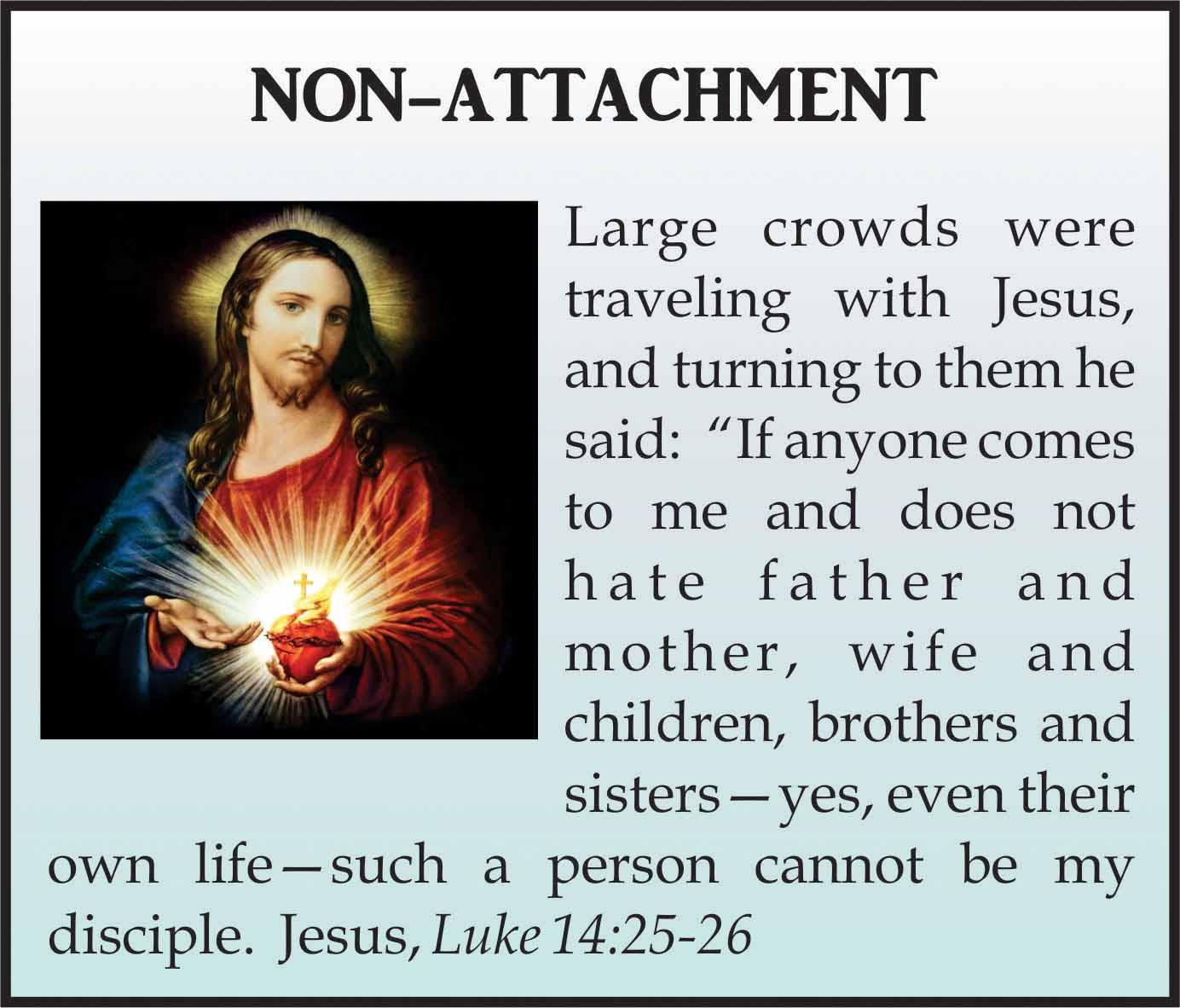NON-ATTACHMENT and HAPPINESS
Spiritual traditions speak of being non-attached. What does it mean to be non-attached and how does this affect our ability to be happy? Non-attachment can only be defined by thinking of what are attachments and then how we are attached. We are attached to things outside of us and also to thoughts. With regard to the latter we may be attached to an opinion of ourselves and ultimately we are attached to the idea of being a separate entity; an ego; the I-thought.
To be attached to something means we are not willing to let go of it. Of course it is not possible to permanently own anything in this world of form because the world, the universe, is eternally changing. Every object we cherish will eventually go away and when this happens, we will be unhappy. 
In the quote from Jesus just to the left, the word used to describe non-attachment is "hate." This is a poor translation from the original Greek Bible. As we know Jesus did not advocate hating anyone.
To be non-attached also means to stop rejecting that which is adverse or unpleasant. When misfortune comes our way, we accept it. That doesn’t mean we cannot do something to alleviate the misfortune. We can also accept the possibility of a transformative or healing action and pursue it. But if there is nothing that we can do, then that must also be understood and accepted.
What about Adolf Hitler or Joseph Stalin? Do we accept them and the horrendous suffering they and people like them bring to the world? Yes, we accept them and we also accept that we must oppose their activities. We oppose them not for our own gain but for the benefit of others. It is our dharma, our duty, to oppose evil and relieve suffering as much as possible. So we accept that too. In all of this we are still non-attached. We are accepting everything.
Non-attachment means we willingly allow events to come and go and we are willing to take action where it is warranted. We are also willing to accept that which is beyond our power to affect. This does not mean we quit. It means we find smaller bites to chew.
For example, we will not be able to bring an end to all poverty today. However, we can decide to donate some amount of money to our favorite charity each month. Non-attachment gives us the clear minded view of events that allows us to make precisely accurate decisions as to the nature of the events and how we should interact. Thus, non-attachment is not being aloof. It is the opposite of that. It is an attitude of equal acceptance. It is an equal minded view that allows us to say yes to all of life. It is attachments with its collection of desires and aversions that make us aloof. For example, attachments cause us to see other people as instruments to fulfill our desires or as enemies that may steal away the objects of our desires. In either case, we are aloof or separated from others.
There can be some delusion and confusion about illusion. Some say the world is an illusion and they lose any sense of duty or ask why we should show compassion to others. They ask why we should show compassion to an illusion? Why should we strive to improve the plight of illusory people in an illusory world? Why should we do spiritual practices if it is all a dream? Such a state of mind will imagine that it is practicing non-attachment. In truth, this is nothing more than slothfulness or laziness masquerading as spirituality.
The world is not an illusion. The ego is an illusion. The presence of the ego creates the illusion of the world being separate from our selves. The ego defines itself by having something else, the world, be relative to it. If something is relative to us, it is separate from us. So that which is illusory has to do with the condition of our mind and not the world.
We should be clear. Non-attachment is not the same as indifference. Non-attachment is saying, "Yes" to all of life while indifference is a tomb that prevents us from connecting with life. Indifference is the fruit of the ego while non-attachment is the fruit of love. Being non-attached to family and friends in no way means we do not nor cannot love them. It means we are not depending on any of them for our own happiness. We give them our love and our care but expect nothing in return.
If we imagine that the objects and persons of the world are permanent, then that is an illusion. If we see the world and everything about it as our own Self, then that is reality. In either case, the world does not cease to exist.
While it is true the nature of form is endless change, it is also true that there is no beginning or end to this activity. When taken as a whole, the world is real. It is absolute. When it is fragmented into parts by the mind, it is an illusion.
We have been told by the Mahatmas that the world – the universe – is a play; a sport; a dream – in Sanskrit a leela. As such, it does not have an ultimate goal. We may become discouraged at hearing this and abandon any self-effort with regard to making spiritual progress or working to relieve the suffering of others. If it is all a play, why make any effort?
This sense of abandonment occurs when our own goal-oriented thought processes are confronted with a play or dream that has no ultimate or absolute goal. A child has no problem with this. She can play with her baby doll or he can play with his plastic soldiers for hours. If we point out to the child that the baby doll is not really sucking the make-believe bottle or the soldiers are not really doing anything, they will look at us with a puzzled “so what” expression.
Non-attachment is like being an actor in a theater. The actor knows the play is not real and that it will come to an end. The actor sees it for what it is – a play, a sport, a dream – but enjoys the moment and puts his or her all into playing the part. God wrote this magnificent script and gave us a part to play. Our problem is we have forgotten how to play. Our heavy egos, bearing such a preponderance of attachments, have left us holding so much anxiety and fear. We end up taking ourselves much too seriously. We have lost our innocence. We don’t know how to play.
Instead of laying down on the sofa of indifference and mindless abandonment, we can give our life our most sincere and concerted effort like any good actor. We can enjoy participating in God’s theater of the sublime. This is not possible if we are attached. We will be worried about the end of the play not wanting it to be over. We don’t realize that when we walk off one stage we walk onto another stage. We become attached to our character and don’t want to take off the makeup and the costume when the play is over. We are unable to flow effortlessly from one moment to the next; from one world to the next.
Without non-attachment there can be no unconditional love – pure, selfless love. Attachments taint any love that may percolate up from the realm of the heart. Attachments cause us to think in terms of what’s-in-it-for-me. Thus attachments stifle love and this is actually a state of spiritual death.
Attachment is really a disease and non-attachment is the healthy state of being. Non-attachment allows us to be a useful, productive and happy human being.
Review and/or purchase the book How to Be Really Happy! on Amazon by clicking the book cover below


